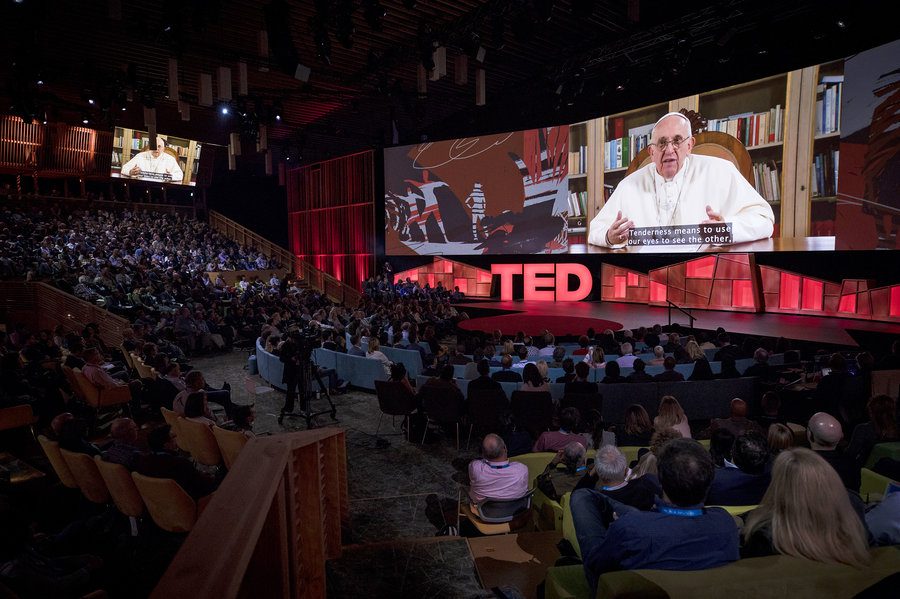MIT Students Heading to the Vatican, and More – Boston News

Let’s explore some of the most interesting stories that have emerged from Boston business schools this week.
MIT Students Heading to Rome for First Ever Vatican Hackathon – MIT Newsroom
The first of its kind VHacks will take place in Vatican City from March 8-11, bringing in 120 students from various universities around the world to the city-state of the Roman Catholic Church.
“This is not just for the church,” said Sophie Liao, MIT Sloan MBA ’18, in an interview with Meredith Somers from the MIT Newsroom. “This is more about breaking boundaries. Everyone is a migrant, everyone should be involved in this discussion no matter what country they come from.”
“While this is the first event of its kind at Vatican City, using technology to address more than just science isn’t a new thing for the sovereign state’s most famous resident. In a TED Talk last year, Pope Francis suggested how ‘wonderful it would be if the growth of scientific and technological innovation would come along with more equality and social inclusion.'”

Pope Francis made a surprise Ted Talk in 2017, discussing the importance of humility / Photo via Ryan Lash, TED
You can read more about the upcoming VHacks event in Vatican City here.
Sawyer Introduces New Master’s in Marketing – Sawyer Business School
The Sawyer Business School at Suffolk University has announced its new Master of Science in Marketing degree, which prepares students to “approach complex marketing problems, analyze information, and develop high-quality strategic and tactical solutions.”
“Most master’s-level programs in marketing give the qualitative tools pretty short shrift,” says Professor Elizabeth Wilson, chair of the Department of Marketing. “But knowing how to do that kind of research and understanding the whole spectrum of social science research methods is something every employer will value.”

Product management is one of the three concentrations offered in the new Master’s of Marketing program at Suffolk / Photo via nbbj
Three concentrations will be offered as part of the new Master’s program, including: product management, global marketing, and market research and customer insights.
“’I’m excited to see the new MS in Marketing program. The marketing landscape is constantly evolving, and the way brands need to talk to their customers is evolving as well,’ says Victor Davidson, MBA ’12, senior vice president of analytics at SavingStar. ‘The new degree program will empower students to stay on the forefront of these changes and position themselves as top marketers.’”
You can read more about the MSM here.
How News Coverage is Impacting ExxonMobil’s Social Responsibility – Simmons School of Management
Simmons School of Management professor Edward Vieira recently co-authored a study that analyzed ExxonMobil’s corporate social responsibility messages over a 12-year period, from 2002-03, to “determine if there was a relationship between news coverage and subsequent CSR efforts.”
“Corporations that don’t live up to stakeholder expectations may experience a decrease in credibility, reputation, and legitimacy. It’s beneficial for an organization to consistently communicate its CSR actions as well as address culturally relevant events. Therefore, it’s logical that as the world’s fourth largest oil producer, ExxonMobil’s CEO’s letters delivered CSR messages that focused on major external events.”
Read more about Professor Vieira’s research here.
Boston News: MIT Tackles Universal Basic Income, Negative Reviews, and More

Let’s visit some of the biggest news coming out of Boston business schools this week.
12-Year Study Looks at Effects of Universal Basic Income – MIT Sloan Newsroom
MIT Sloan School of Management associate professor Tavneet Suri, alongside nonprofit company GiveDirectly, will conduct a lengthy, 12-year study into the effects of the constant hot-button issue of universal basic income. UBI is a basic concept that an acting government will assist its citizens by distributing a recurring stipend, supplementing the loss of jobs to things like automation.
“Suri is conducting the research along with MIT professor Abhijit Banerjee, Princeton professor Alan Krueger, University of California San Diego professor Paul Niehaus, and GiveDirectly president Michael Faye. Overall, GiveDirectly expects to transfer $25 million to more than 21,000 people (not including the control group), 5,000 of whom will receive cash transfers for 12 years. The money comes with no strings attached.”
Read more about the extensive MIT UBI study here.
The Costs and Benefits to Responding to Negative Online Reviews – BU.edu
When BU Questrom marketing professor Georgios Zervas and USC’s Davide Proserpio looked into thousands of TripAdvisor reviews, they found a fairly surprising turn: hotel managers that actively engaged with reviewers, positive or negative, may have actually helped their overall ratings. Zervas notes that it actually diminished the number of negative reviews because users were more wary when they saw hotel staff members participating in a conversation.
However, the two found that the reversal cause of this interaction was that negative reviews who did leave reviews, after engaging with the hotel staff, tended to leave longer reviews—which often made the negative details much more elaborated and personal. Zervas notes this is still probably good overall, saying, “The remaining negative reviews are detailed and contain constructive feedback that [hotel management] can act upon.”

BU professor Georgios Zervas and USC’s Davide Proserpio found uniquely beneficial ways companies can utilize review sites like TripAdvisor.
Read more about BU Questrom’s study on TripAdvisor here.
What Could Amazon’s Approach to Health Care Look Like? – HBR
The Amazon, Berkshire Hathaway, and JP Morgan Chase venture to disrupt the healthcare industry led to a minor panic for other healthcare shareholders, but its potential impact is still fairly uncertain. HBR writer Robert S. Huckman and admitted Amazon shareholder recently explored the potential positive impacts, including simplifying a very complex U.S. healthcare prescription service industry, “simplifying data capture,” and the repeated effort from Amazon to improve its services to regular customers.
On the latter reason, Huckman explains, “Amazon has an internal challenge — managing the health and health spending of its employees — that is shared by many other companies. Yet Amazon likely does not have a full “solution” in mind just yet. Rather, it has ideas and hypotheses to test. By creating a space in which those ideas can be tested, Amazon may be able to play a key role in allocating resources to solutions that show themselves, over time, to be promising.”
You can read more about Huckman’s outlook for Amazon healthcare here.
